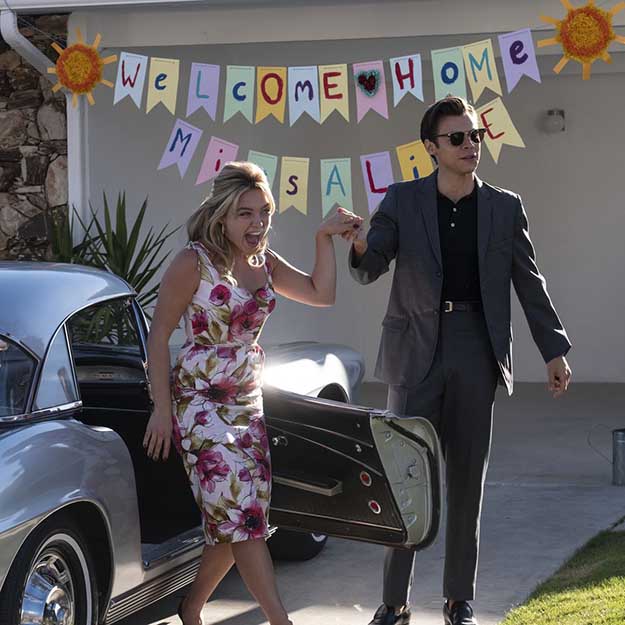What a shiny con job.
Olivia Wilde's follow-up to her dazzling directorial debut Booksmart (2019) is the retro psychological thriller Don't Worry Darling, which is one of the best-looking movies of the year and has an intriguing premise that cribs quite liberally from films ranging from Rosemary's Baby to The Stepford Wives to The Truman Show to certain movies by M. Night Shyamalan and Christopher Nolan. But beneath its glossy surface, this is nothing more than a cheap parlor trick, with heavy-handed messaging about female empowerment, and a final act that is neither surprising nor remotely plausible, and not nearly as shocking as it was surely intended to be.
If someone made a documentary about all the fuss and holler and controversy surrounding the making and publicizing of this film, it would probably be more interesting than the finished product, which is one of the more disappointing efforts of the year. Despite Wilde's gift for well-timed needle drops, mood-reflecting camera angles, shifting color palettes and ambitious fantasy/flashback/nightmare sequences, as well as the star-power performance of Florence Pugh in the lead, Don't Worry Darling is mostly false promises, flash, smoke and mirrors.
Working from a screenplay by Booksmart writer Katie Silberman (based on a story by Carey and Shane Van Dyke, grandsons of Dick Van Dyke), Wilde immediately goes for an unsettling tone with an over-the-top cocktail party in what appears to be the late 1950s, as Pugh's Alice (ooh, she might be going through the looking glass) and her husband, Jack (Harry Styles), get so hammered with their friends we're wondering if the alcohol is laced with hallucinogens. I mean, they're out of control - dancing madly, laughing wildly, as if this is the greatest night of their collective lives. Actually, though, it's just another evening in the town of Victory, where everyone's a winner.
Cut to the next morning, when the wives all put on 1950s sitcom dresses and gather outside their homes in Cul-de-Sac Suburbia to bid good day to their husbands, who drive away in their brightly colored sedans and head to the desert and their jobs at the Victory Project, a super-important, ultra-secret government venture that will make the world a better place.
Meanwhile, the wives gossip by the pool, take ballet classes, go shopping and prepare dinner as they await the arrival of their husbands, who are not allowed to talk about their jobs. (When Jack comes home, the dinner table setting is immediately at risk, as he and Alice are so hot for each other they never seem to make it to the bedroom.) It's as if they're all living in a bubble and they've escaped the pressures of the outside world for life in this seemingly idyllic community. Ah, but the fractures in the veneer come early and often. Alice cracks open eggs in the kitchen, but there's nothing inside. One of the housewives, KiKi Layne's Margaret, begins to melt down and question why they're all here. Jack and his best friend, Bill (Nick Kroll), speak in worshipful tones of their boss and mentor and the community's leader, Frank (Chris Pine), who hosts a lavish party at his home and gives a speech straight out of the cult leader's handbook.
What is going ON here? Alice becomes increasingly disoriented and suspicious about the true nature of her existence, as she begins to experience hallucinations and perhaps flashbacks, some staged as if we're watching a Busby Berkeley production number. Then there's the bizarre company dinner, at which Jack is given a coveted promotion and is coerced by Frank into dancing like a mad puppet for what seems like forever.
When Alice begins to voice her suspicions about the Victory Project and the true motivations of Frank and his minions, she's like a stereotypical Hysterical Female who needs to be medicated and should stop asking questions. We get some almost laughingly obvious plot hints, including the discovery of a secret medical file, as Alice easily outwits and outmaneuvers the town's red-uniformed security detail, who are supposed to be menacing but actually are quite incompetent, like the townsfolk in The Truman Show who did such a bad job of keeping up the ruse once Truman began to suspect something was afoot.
Pugh is an absolute force onscreen, and she sells every second of her performance, even when the plot careens into bizarre corners. Pine leans into the near-campy role of the obviously nefarious Frank, and it works. Alas, while Styles looks the part of a movie star, at this point he's too much of a lightweight to hold serve in his scenes with Pugh. Not that even a young Daniel Day-Lewis would be able to fix the myriad plot potholes in this glossy misfire.
Don't Worry Darling
Two stars
STARS: Florence Pugh, Harry Styles and Chris Pine
DIRECTOR: Olivia Wilde
RATED: R for sexuality, violent content and language





Read Comments